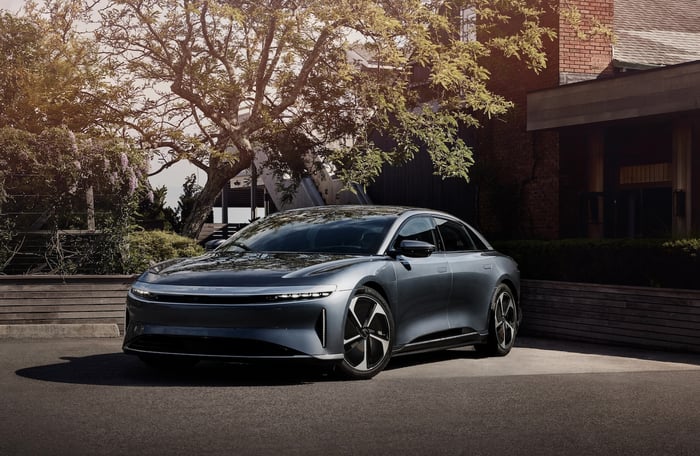Shares of electric vehicle maker Lucid (LCID -3.03%) have had a mostly downhill ride since the company's market debut, falling over 90% from their 2021 price peak.
However, the company has made substantial progress since 2021. Its first model, the Air luxury sedan, has received wide acclaim. A big SUV will join the lineup by the end of this year.
Lucid's second-quarter results -- reported Aug. 5 -- were better than expected, but it's still a long way from profitability. But it has a plan to get there, and a big investor with deep pockets.
Is that enough to make the stock a buy?

The Lucid Air has some of the best EV tech in the business. Sales so far have been modest, but an upcoming SUV should help. Image source: Lucid Group.
The Lucid bull case: Best-in-class EV tech
Lucid says that it makes the most efficient EVs. The data largely backs that claim: In base "Pure" trim, the 2025 Lucid Air sedan is rated at 146 MPGe, or "miles per gallon equivalent," the U.S. Environmental Protection Agency's standard for comparing the efficiency of EVs. The next closest competitor, Lucid says, gets only 122 MPGe.
That isn't just a technological bragging point. Higher efficiency -- a function of both battery chemistry and the software that controls the EV's battery pack -- means that an EV maker can use fewer battery cells to deliver a given range.
Given that an EV's battery pack can account for as much as half of its total materials cost, reducing the size and cost of the pack makes a big difference in the cost of the car.
In theory at least, that means that an EV maker with a more efficient battery can deliver a given vehicle at a lower cost than rivals. The difference in cost can be used to lower the price, increase the automaker's profit, or both.
That's a clear competitive advantage -- one that Lucid hopes to license to big automakers that might not be able to develop similarly efficient batteries in-house. (This isn't wishful thinking on Lucid's part: It already has a deal to provide EV tech to British supercar maker Aston Martin.)
Of course, Lucid will need to scale up significantly to realize that advantage in any meaningful way with its own EVs. And while it has a plan to do that, the plan requires two things that Lucid might or might not have: Time, and a lot of money.
The Lucid bear case: Cash burn makes it vulnerable
For Lucid, time and money are closely linked variables. The company is burning cash in an effort to scale up to a sustainably profitable size. For example, Lucid's revenue in the second quarter of 2024 was about $200.6 million -- but the cost of that revenue was $470.4 million.
As Lucid's sales volumes grow, economies of scale will help turn its losses into profits. But even in the best case, that point is probably still several years away.
Right now, Lucid's cash reserve at any given moment is a measure of how long the company will be able to keep the lights on. As of the end of the second quarter, Lucid's cash and available credit lines totaled about $4.28 billion. That was augmented earlier this month by a $1.5 billion commitment from Lucid's largest investor, an affiliate of Saudi Arabia's Public Investment Fund (PIF).
During Lucid's earnings call on Aug. 5, CFO Gagan Dhingra said with the new funds from PIF, Lucid had enough to fund operations "at least into the fourth quarter of 2025."
But what happens after that?
The question mark: How much more are the Saudis willing to invest?
A better way to ask that question might be, "How much more is PIF willing to invest in Lucid?"
PIF, which owns about 60% of Lucid, is the EV maker's biggest investor by far. Including that recent $1.5 billion, which followed a separate $1 billion investment earlier this year, PIF has invested about $7.9 billion in Lucid since 2018.
That's a lot of money for a stake in a money-losing EV start-up. On the other hand, PIF is a huge fund, with about $925 billion under management, and a mandate from the Saudi government to help drive an economic agenda aimed at weaning the country's economy off of oil.
PIF can easily afford to keep Lucid going as long as the company has a clear path to profitability. Right now, with development of that future midsize model underway and a plan to enter into partnerships with more established automakers, it does.
Is Lucid stock a buy?
As I see it, there are three probable paths for Lucid from here.
- It gets incremental additional investments from PIF as needed, executes on its plan, and becomes sustainably profitable in a few years.
- It gets acquired by a major global automaker that wants Lucid's team and advanced EV technology.
- It gets additional investments from PIF and muddles along for a while, but never quite reaches profitability -- and eventually, the Saudis pull the plug and Lucid goes bust.
On balance, I think that makes it a risky buy. If you invest in Lucid stock now, the first two paths will almost certainly pay off if you're patient.
Just keep in mind that the third path is a real possibility, and size your investment accordingly.





